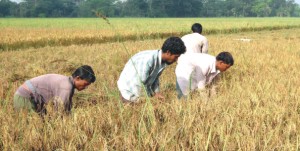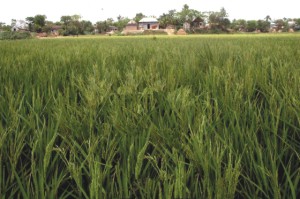In Retrospect
Homecoming
Pradeep Dutta
 When we were young, we had heard from my father, and my uncle and aunts, that though we were now settled in India, we had originally come from Barisal, which was a town in Bakarganj (Barisal) District of undivided India in Bengal. The name of our ancestral village was Batajore (also known as Harhar) which, was and still is in the Sadar Division of Barisal District. We are a branch of the family of Babu Aswini Kumar Dutta, the great social leader and freedom fighter of Barisal; founder of Brojo Mohan School and Brojo Mohan College in the late nineteenth century (CE), in memo of his illustrious father who was a judge in the Munsif court in Krishnagar (Nadia). Their portion was in the Western side of Batajore village; ours was located in the Eastern part.
In my mind's eye I would visualise the verdant lush countryside of our village with ponds, tanks overflowing with succulent fish; freshly grown organic vegetables in our home kitchen garden (no inorganic fertilizers then); paddy fields growing the famous Balam rice of Barisal and of course the famed Musur dal (a kind of lentil); the profusion of areca-nut and coconut trees which are quite prized in Barisal, swaying in the breeze wafting from the bay of Bengal.
We had two houses in the ancestral village, one was a stone structure very ancient and the other was like other houses in rural Bangladesh with tin roofs. I thought about the fun my father and his brothers and sister had during holidays, swimming in the ponds and dighis which belonged to our. It would rain for days as was typical in Barisal those days in the rainy season, and the ensuing musical pitter-patter of rain falling on the tin roof of our family house was like piped music while my folks enjoyed siesta, with my great grandmother narrating folk tales (Thakurmar Jhuli) to my uncle and aunts' wrapped up in home-made kantha (coverlet) under the dark canopy of Monsoon clouds with occasional thunder-claps.
We had heard from my father that the famous Botanist, Sir Jagdish Chandra Bose had once come to our village to see a tree which had fallen down in a rather peculiar way. Then there was the 'Barisal guns,' an inexplicable geographical phenomena in which sometimes booming sounds like those of cannon shots was heard all over Barisal and its environs.
I was therefore thrilled when I got the news that I had been posted to Bangladesh in the Indian Consulate in Chittagong. The first thought that came to my mind was that after settling down in Chittagong, I shall literally tear away to Batajore on the first available opportunity.
Finally I got some leave. My wife and I caught the morning bus from Nathulabad Bus Depot, on the outskirts of Barisal town, and reached our village, now known as Batajore bazaar. The bazaar was at one time owned by our family and called Dutta Bazar then. A frisson of excitement went up in my body when I alighted in my village of my ancestors which I had not seen before. Home sweet home at last....
 People came to know of our visit and were curious to speak to us and enquire about our family back in India. One person Mr Nandi whose family were our neighbours in the village recognised our family. He took us to our home, leading us through a small bridle path, which is now occupied by the progeny of our then family retainer Aham Piada. On the way we saw a small quaint temple beside a largish dighi, which seemed to be more than two hundred years old, though still in good shape. On top of which was inscribed the name of our ancestor Harindra Nath Dutta Majumdar. "Majumdar" being the title bestowed by the Mughal rulers of Bengal on our forefathers. Mr Nandi told us that many people come to the temple to pray during their adversity or for getting a child; some for getting good grades in exams. Soon we espied our ancient stone house. The person living now in our land, Mr Rauf, grandson of our retainer Mr Aham Piada and his spouse welcomed us and took us inside and enquired about our family, he told us that the stone house of ours is in a dilapidated condition and is no longer habitable. Many of the curious onlookers came to look at us. Mr Rauf ordered a man to cut a few luscious grapefruits for us from a tree in front of the house. I asked him about the fabled Balam rice and Musur dal; he said in this age of hybrid varieties all the old species of rice has been obliterated from Barisal. He then proceeded to show us the Durga Dalan in our homestead where the Durga puja festival was celebrated, and is still held every autumn with gusto and religious fervour. I saw a Chalta tree bend down almost touching the water of the dighi: I presumed perhaps it might be the same tree which Sir Bose had come to see. People in the village said the tree is more that a hundred years old and yet still going strong giving forth fresh green leaves every spring! People came to know of our visit and were curious to speak to us and enquire about our family back in India. One person Mr Nandi whose family were our neighbours in the village recognised our family. He took us to our home, leading us through a small bridle path, which is now occupied by the progeny of our then family retainer Aham Piada. On the way we saw a small quaint temple beside a largish dighi, which seemed to be more than two hundred years old, though still in good shape. On top of which was inscribed the name of our ancestor Harindra Nath Dutta Majumdar. "Majumdar" being the title bestowed by the Mughal rulers of Bengal on our forefathers. Mr Nandi told us that many people come to the temple to pray during their adversity or for getting a child; some for getting good grades in exams. Soon we espied our ancient stone house. The person living now in our land, Mr Rauf, grandson of our retainer Mr Aham Piada and his spouse welcomed us and took us inside and enquired about our family, he told us that the stone house of ours is in a dilapidated condition and is no longer habitable. Many of the curious onlookers came to look at us. Mr Rauf ordered a man to cut a few luscious grapefruits for us from a tree in front of the house. I asked him about the fabled Balam rice and Musur dal; he said in this age of hybrid varieties all the old species of rice has been obliterated from Barisal. He then proceeded to show us the Durga Dalan in our homestead where the Durga puja festival was celebrated, and is still held every autumn with gusto and religious fervour. I saw a Chalta tree bend down almost touching the water of the dighi: I presumed perhaps it might be the same tree which Sir Bose had come to see. People in the village said the tree is more that a hundred years old and yet still going strong giving forth fresh green leaves every spring!
We bid adieu to everybody, after a hot glass of pure cow's milk from our village, which tasted like ambrosia. With tears welling up in my eyes we went back to catch the bus to Barisal town.
Our next port of call Inshallah (God willing), if tomorrow comes, will be to Pathakkandi in Madaripur District. the ancestral village of my maternal parents, which was beside the Arial Khan river. Some old folks say the village has been decimated due to the change of course of the terrible river; an old fakir, however, avers it is still there!
The writer is Incharge Administration Asst. High commission of India Chittagong.
Copyright
(R) thedailystar.net 2009 |
